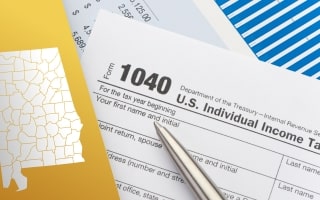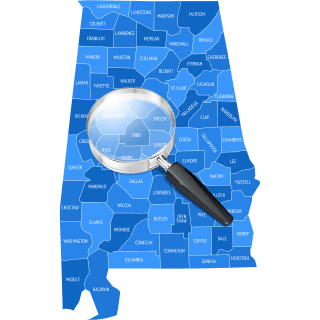Property Tax Records in Alabama

Alabama has some of the lowest property taxes in the country, but that figure alone doesn't accurately represent an individual resident's tax burden. The median property tax bill in the United States is $2,900. At $674, Alabama's average property tax bill is one-quarter of the national average.
The tax rate is only .39 percent, and Hawaii is the only state with a lower rate, at .27 percent. Alabama's median home value is $230,000, while Hawaii's is $748,000, resulting in very different taxes paid to the respective states.
Property taxes pay for the bulk of services that a state offers to its residents, such as schools, infrastructure maintenance (highways and bridges), and support for senior citizens.
Historians say that Alabama's property taxes were set in 1901 to favor wealthy people at the expense of lower-income residents. The constitutional right to low taxes means that the state imposes many fees to make up for shortfalls in funding things like schools (Alabama ranks 45th in the country in education).
Residents who go to court pay fees, and emergency services like ambulances are dues-based. The effective tax rate or tax burden to residents is much higher than it seems. When all of the state's taxes are considered, Alabama's effective tax rate is 9.8 percent, ranking it 20th in the country.
Property Tax Assessment in Alabama

Property tax assessment in Alabama is confusing, though not overly complicated. Your property taxes are based on the value of your property and the county you currently live in. Properties in Alabama are classified by use: personal, commercial, residential, and agricultural. Each classification carries state and county tax rates.
Alabama's state constitution limits income taxes to 5 percent, and property taxes are likewise defined by state law. The calculation is as follows:
- Taxes are calculated on 20 percent of a property's assessed value
- Millage rates (the tax rate) are constrained by the state constitution to a maximum of 6.5 mills (three mills for education, one mill for relief, and 2.5 mills for general use)
- Each mill is equal to one-tenth of one percent, so the maximum millage rate is $6.50 per $1,000 of property value.
- Counties levy an additional property tax unless the resident/owner is exempt, which can include being over age 65, blind, or permanently disabled. Property owners must file annually for exemptions.
- Owners of land certified as agricultural or timber may seek a lower rate for property tax calculations.
Property valuations are determined by factors like the age of the structure or equipment, and the applicable multiplier is calculated. Alabama stipulates that real property classifications must reflect the current use of the land to qualify for the lower tax rate that applies to agricultural land. Each county has a Board of Equalization that is responsible for managing assessments, including comparing them to actual sale prices periodically for accuracy.
Residents have the right to seek an abatement of taxes, which is a reconsideration of the value calculation and tax percentage. This must be requested during specific periods. Alabama property tax appeals differ from counties, so you will need to check with your county tax assessor's office or the Board of Equalization for information on appeals.
If a homeowner falls behind in their tax payments, there is a redemption period during which they can get caught up before the state exercises the right to sell a lien on the property. Owners should be aware that investors who buy tax liens often foreclose on the property and take title, forcing owners out. The state keeps a list of delinquent properties by county. The average tax rates in the top five Alabama counties are:
- Jefferson County: 0.71%
- Madison County: 0.51%
- Mobile County: 0.56%
- Baldwin County: 0.36%
- Tuscaloosa County: 0.39%
When buying a house in Alabama, you can see that property tax rates vary, though not by a lot. However, if you're buying a house, keep in mind that property taxes in Jefferson County, the most populated county in Alabama, you're going to pay more in taxes than in Tuscaloosa or Baldwin County.
Calculate Alabama Taxes
It is wise to use a property tax calculator to properly understand how property taxes are calculated in Alabama. This tool makes the calculation process simple for both homeowners and real estate investors. An Alabama property tax calculator allows users to input key information about their property and sum up their current tax assessment and tax liability.
In addition to gaining a clearer understanding of your annual tax obligations, using the Alabama property tax calculator can also help in determining your eligibility for any exemptions or special tax rates.
using our property tax calculator.
Alabama Property Tax Records: What Are They?

Property taxes are the lifeblood of each county and state government. The funds derived from property taxes allow states to function and provide the essential services residents require, such as public schools.
Every county in Alabama keeps records of property taxes and other information that might interest you. This information is made available to the public through online databases. Property tax records in Alabama reveal the standard of living in different parts of the state. Those with the lowest taxes have properties with the lowest values and are likely to be the residents with the lowest income.
If you're interested in learning about a property before you make an offer, tax records can tell you practically everything you need to know. Information about previous renovations and remodels should be included in these documents. The information that Alabama property tax records contain includes the following:
-
Owner Name
-
Parcel ID number
-
Property address
-
Mailing address
-
Appraised value
-
Subdivision
-
Neighborhood
-
Assessed value
-
Tax breakdown via districts
-
Historical tax payments
-
Building type
-
Year built
-
Number of stories and rooms
-
Total improvement value
-
Extra features
-
Ownership history
-
Deed information
-
Photos
Property Tax Exemptions and Deductions in Alabama

Property taxes can be burdensome for those with limited incomes. To that end, Alabama offers some limited relief for those whose tax bills are difficult to pay. Property tax deductions may be claimed on federal taxes if the individual or household itemizes deduction on their annual return. This chart shows the amount of taxes owed by income level. There are numerous exemptions that homeowners in Alabama might qualify for. Here are a few Alabama property tax exemptions that you may qualify for.
Homestead Exemption: Alabama offers a Homestead Exemption for the primary address of residents who apply before the start of each tax year. If approved, this exemption will be for up to $4,000 in state taxes and $2,000 in local property taxes for those under age 65.
The exemption does not apply to more than 190 acres of land. Those over age 65 do not have a maximum exemption amount for state property taxes, but the county tax exemption remains at $2,000 or less. The application period is from October 1 to December 31.
Additional Homestead Exemption for Senior Citizens: Another new tax exemption program freezes the taxes of those over age 65 upon approval of an application to the program. This " special senior exemption" is in addition to the homestead exemption and senior/disability exemptions.
Homestead Exemption for Veterans: In Alabama, veterans or their surviving spouses may qualify for a property tax exemption if their home was acquired via a " specially adapted housing grant" program through the Veterans Administration. If you have a total disability based on a service-related injury, this exemption will cover 100% of your property taxes. Residents should inquire at their county tax assessor's office for information.
How To Search Property Tax Records in Alabama

There are several options for checking property taxes on specific addresses in Alabama. First, county departments of revenue often make the information searchable in online databases by owner name or address. Most counties allow you to search by partial or full address.
Other websites like PropertyChecker offer the same access to tax information because the rates and property valuations are public information. When searching for property data, you can input anything from the parcel ID to the property address. If you know the phone number or email address, this info can also be used to find homeowners name and property tax records in Alabama. During your search, you should gain access to information like:
-
Purchase history
-
Property details
-
Property owners
-
Deeds
-
Loan records
-
Lien records
-
Foreclosures
-
Property values
-
Neighborhood info
-
Building permits
How To Appeal Property Taxes in Alabama

Each county in Alabama has a Board of Equalization that handles residents' appeals of property tax bills and assessments. Residents have 30 days (check deadlines with your county tax office) to file an appeal of their property assessment. Find here the list of tax offices in the state.
Property owners often appeal their tax bill when the assessment value is too high. A higher value can lead to a substantial increase in the amount of taxes you pay. If you haven't renovated your home over the past year, the appraiser might have made a mistake. Follow the steps below to complete the appeals process.
Step 1: Once you receive your assessment notice, you can submit an online appeal or written notice of appeal to the county assessor. You must do so within 30 days. Make sure you provide proof as to why your home's assessment value should change.
Step 2: If your appeal is denied during the informal hearing, you can request a formal one with the Board of Equalization. They'll look at the evidence you've already submitted.
Step 3: Even if the Board of Equalization doesn't grant your request, you can still file an additional appeal with your local Circuit Court. Keep in mind that your taxes must be paid by the end of the year. Even if your final appeal has yet to be heard, you need to pay the taxes you owe to avoid penalties.
Step 4: When appealing to the Circuit Court, you'll have 30 days to submit the document. Make sure all supporting evidence is included with your appeal.
How Property Tax Records Impact Real Estate Transactions in Alabama

People buying Alabama real estate are sure to glance at property taxes to understand the valuation of the property – as well as to find out when improvements were made. Things like adding a second floor, a garage, or renovating a kitchen may all impact the amount that a property owner pays.
Once in a while, a county has revenue issues and raises taxes to cover the cost of an important project like a new school or overpass. Prospective buyers should be aware that these increases in taxes rarely go away; once they increase, they stay high. This can dissuade some buyers from making a purchase or cause current owners to flee the area, flooding the market with low-priced homes.
Since Alabama has some of the lowest property tax rates in the country, they won't factor into every real estate transaction. However, the country-specific rates might play a small role in pushing buyers to focus on one location instead of another. For example, the tax rate in Lee County is around 0.58%. In St. Clair County, it's just 0.35%, which can make a notable difference when it comes to calculating monthly mortgage payments.
Investors will also consider property taxes before buying a rental home. Property taxes increase mortgage payments. If an investor is required to pay high property taxes, they won't earn as much cash flow every month. It's possible to avoid this problem by increasing rent or by purchasing real estate in counties with low tax rates.
Investors are an important aspect of the Alabama housing market. When a resident is negligent about paying taxes, property tax liens are attached to the deed of a home and must be paid before the property can be sold. In Alabama, the state actively lists liened properties and sells those liens to "investors" to make the state whole. Investors who pay the overdue taxes can then use leverage to foreclose on the property and take the title to it if the owner doesn't pay the investor the amount of the lien plus penalties.
The Alabama Department of Revenue is the state agency that administers state property taxes, sales taxes, and other accounts receivable for the state. The department also organizes tax lien sales, which allows investors to purchase interest in private property by paying the owner's past-due taxes. In these situations, it's easy for a property owner to be foreclosed on and for the investor to take ownership.
Free Alabama Property Tax Lookup
Tax Records Please wait...
Property Tax Guide
- Property Tax Records in Alabama
- Property Tax Assessment in Alabama
- Alabama Property Tax Records: What Are They?
- Property Tax Exemptions and Deductions in Alabama
- How To Search Property Tax Records in Alabama
- How To Appeal Property Taxes in Alabama
- How Property Tax Records Impact Real Estate Transactions in Alabama
Instant Access to Alabama Property Records
- Owner(s)
- Deed Records
- Loans & Liens
- Values
- Taxes
- Building Permits
- Purchase History
- Property Details
- And More!
Free Alabama Property Tax Lookup
Tax Records Please wait...
Property Tax Guide
- Property Tax Records in Alabama
- Property Tax Assessment in Alabama
- Alabama Property Tax Records: What Are They?
- Property Tax Exemptions and Deductions in Alabama
- How To Search Property Tax Records in Alabama
- How To Appeal Property Taxes in Alabama
- How Property Tax Records Impact Real Estate Transactions in Alabama